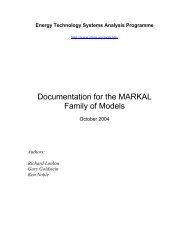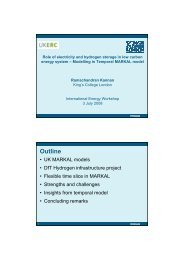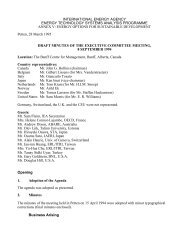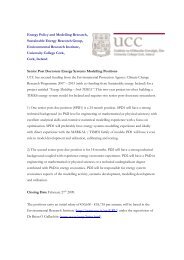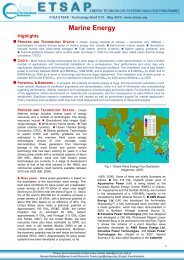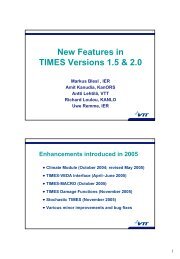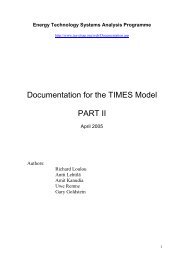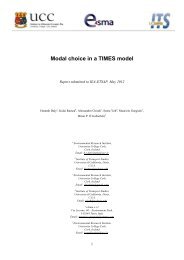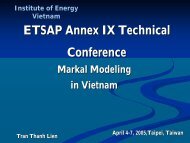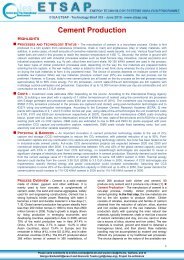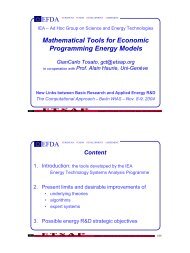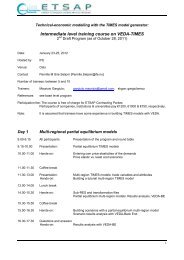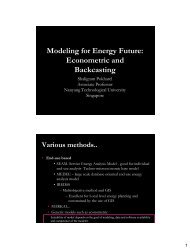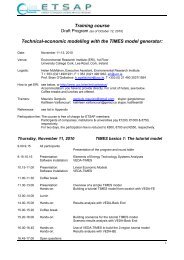Energy Technology Systems Analysis Programme - iea-etsap
Energy Technology Systems Analysis Programme - iea-etsap
Energy Technology Systems Analysis Programme - iea-etsap
Create successful ePaper yourself
Turn your PDF publications into a flip-book with our unique Google optimized e-Paper software.
Figure 5: MARKAL-MACRO (M-M) model integration<br />
for energy efficiency in the UK”<br />
using the extended MDM-E3<br />
model<br />
• Work is progressing on model<br />
development within MDM-E3,<br />
notably the energy demand submodel,<br />
the existing household<br />
energy sub-model and a transport<br />
energy sub-model.<br />
• Work is ongoing to incorporate<br />
endogenous technological change<br />
into MDM-E3, based on energy<br />
learning curve modelling<br />
developed under the Tyndall<br />
Centre ETech+ project.<br />
3.3 UK-PSI and 4CMR are<br />
undertaking additional modelling and<br />
complementary activities<br />
Selected highlights:<br />
• ESM is the core organizer of an<br />
international energy modelling<br />
collaborative effort designed to<br />
quantify scenarios of low carbon<br />
societies (LCS). This involves 12<br />
international modelling teams,<br />
with a heavy developing country<br />
focus. The output of this project<br />
will feed into the G8 Gleneagles<br />
dialogue when Japan holds the<br />
presidency in 2008, as well as in<br />
a special journal issue of Climate<br />
Policy.<br />
• ESM is a core participant and is<br />
providing analytical support for the<br />
UK-ERC integrating scenarios<br />
research project.<br />
3.4. Networking and Coordination<br />
The goal is to develop the coherence<br />
and capacity of UK energy research<br />
modelling, and deepen the interactions<br />
within the UK and with major<br />
international energy modelling groups.<br />
Selected highlights:<br />
• The 1st ESM Annual <strong>Energy</strong><br />
Modelling Conference (AECM) in<br />
December 2006 focused on longterm<br />
modelling of low carbon<br />
societies. This will be integrated<br />
into the UK-Japan LCS research<br />
project. A conference report and<br />
summary were produced and are<br />
available on the UK-ERC ESM<br />
website at http://www.UK-<br />
ERC.ac.uk/content/view/297/792<br />
• Two major international<br />
workshops on innovation in<br />
energy systems took place at the<br />
UK-ERC Meeting Place in Oxford<br />
in March and September 2006. A<br />
conference proceeding was<br />
produced, and is available on the<br />
UK-ERC ESM website.<br />
• ESM hosted a major international<br />
conference on MARKAL modelling<br />
via the International <strong>Energy</strong><br />
Agency’s ETSAP network. This<br />
was held in Oxford in November<br />
2005, and focused on state-of-theart<br />
international energy technology<br />
modelling, as well as showcasing<br />
the full range of UK energy<br />
modelling programs, a<br />
conference proceeding was<br />
produced.<br />
3.5. Example Project: <strong>Analysis</strong> of<br />
Long-Term carbon reduction<br />
scenarios using UK MARKAL-<br />
MACRO<br />
A major application of the UK MARKAL<br />
energy systems model has been to<br />
quantify the cost and energy system<br />
implications of long-term 60%<br />
reductions in CO 2<br />
emissions. This<br />
project was commissioned by the<br />
Department of Trade and Industry (DTI)<br />
and DEFRA as part of the analytical<br />
underpinning for the 2007 UK <strong>Energy</strong><br />
White Paper <strong>Energy</strong>. The new MARKAL<br />
model has undergone a complete<br />
rebuild with a range of enhancements<br />
8



